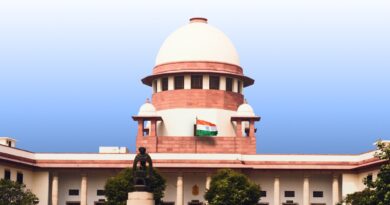Supreme Court criticizes High Court for Bail Delay, grants relief to corruption accused
Supreme Court questions Punjab and Haryana High Court’s approach, emphasizes merit-based bail decisions over procedural delays
NewsArc Bureau
New Delhi, September 5, 2025 – In a sharp rebuke of judicial handling procedures, the Supreme Court has criticized the Punjab and Haryana High Court for its “cryptic and unusual” approach to an anticipatory bail application, while granting relief to a patwari accused in a four-year-old corruption case.
Case Background
The apex court bench of Justices JB Pardiwala and Sandeep Mehta granted anticipatory bail to Gursewak Singh, a revenue official (patwari) facing corruption charges, while delivering pointed criticism of the High Court’s procedural approach. Singh had been charged in a 2021 First Information Report filed by the Economic Offences Branch in Ludhiana under the Prevention of Corruption Act and Indian Penal Code provisions related to bribery and criminal conspiracy.
The case took an unusual trajectory when Singh, after being suspended and later reinstated in September 2023 following nearly four years of inaction by authorities, sought anticipatory bail in 2025 upon receiving a notice to appear before investigating officers.
High Court’s Questioned Approach
Rather than adjudicating the bail application on its merits, the Punjab and Haryana High Court adopted what the Supreme Court termed an inappropriate course of action. The High Court directed the Punjab Director General of Police to explain the four-year delay in both arrest and chargesheet filing under Section 173(2) of the Criminal Procedure Code.
This approach prompted the Supreme Court’s intervention and criticism. “Either the High Court should have allowed the application granting anticipatory bail or declined it on its own merits,” the bench observed, emphasizing that judicial bodies should focus on the substantive legal issues rather than seeking explanations for administrative delays.
Supreme Court’s Reasoning
The apex court identified several compelling factors supporting Singh’s bail application:
Prolonged Non-Arrest: The four-year gap between FIR registration and any arrest action was deemed sufficient grounds for anticipatory bail, reflecting the principle that extended delays in prosecution can justify relief.
Administrative Reinstatement: Singh’s reinstatement to service in September 2023 after suspension indicated official acknowledgment of reduced immediate threat or urgency in the case.
Co-accused Precedent: The court noted that another accused in the same case, allegedly the primary bribe recipient, had already been granted anticipatory bail, establishing consistency in judicial treatment.
Procedural Fairness: The bench questioned Singh’s delayed bail application for a 2021 FIR, to which he explained his initial belief that no active case existed against him given the prolonged inaction and his job reinstatement.
Broader Judicial Context
This decision emerges against a backdrop of systemic concerns about bail processing in Indian courts. Current judicial data reveals significant pendency issues:
- Over 1.2 lakh bail applications remain pending across Indian High Courts as of August 2025
- Punjab and Haryana High Court alone accounts for approximately 8,000 pending bail cases
- The Supreme Court has previously emphasized that even single-day delays in bail decisions can violate fundamental rights under Article 21
Institutional Implications
The ruling represents more than case-specific relief, establishing important precedents for judicial conduct:
Merit-Based Decisions: High Courts are reminded to prioritize substantive legal evaluation over procedural investigations when handling bail applications.
Delay as Grounds for Relief: The judgment reinforces that prolonged non-arrest can independently justify anticipatory bail, regardless of charge severity.
Judicial Hierarchy: The decision reflects ongoing tensions between judicial tiers, with the Supreme Court recently investigating the same High Court over separate procedural irregularities involving “backdated” bail orders.
Legal Expert Analysis
Legal practitioners note this ruling’s significance in clarifying bail jurisprudence. The emphasis on merit-based decisions over administrative explanations could streamline High Court approaches to similar applications, potentially reducing the substantial backlog of pending bail cases.
The decision also underscores the Supreme Court’s expectation that lower courts focus on constitutional rights and legal merits rather than seeking explanations for prosecutorial or administrative delays, which fall outside their direct purview in bail determinations.
Case Resolution
The Supreme Court directed that Singh be released on bail if arrested, subject to conditions set by the investigating officer. This immediate relief avoided further delays that would have resulted from awaiting the High Court’s final decision following its inquiry with the DGP.
The ruling establishes that when faced with prolonged prosecutorial inaction, courts should lean toward protecting individual liberty rights rather than investigating administrative explanations for delays, reinforcing the constitutional principle that justice delayed is justice denied.




